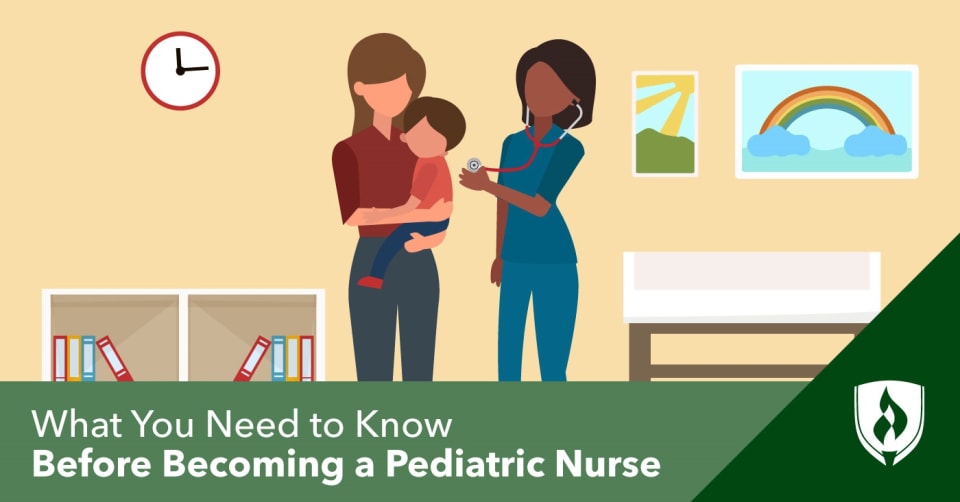
While you know they’re not the only option when it comes to patients, you’ve always imagined yourself caring for children when thinking about a career as a registered nurse (RN). From what you can tell, pediatric nursing seems like an ideal fit for you. You get to be around little ones and make those big, scary medical procedures seem not so bad.
While that sounds amazing, you’re still hoping to get some questions answered before committing to the career. What do pediatric nurses do? What’s a day in the life of a pediatric nurse like? How do you become a pediatric nurse?
We enlisted seasoned nursing experts to help provide answers to these questions and more. Consider their insights to help determine if becoming a pediatric RN is the right choice for you.
What does a pediatric nurse do?
Pediatric nurses are registered nurses who specialize in caring for patients from birth through adolescence. They must have a deep knowledge of child growth and development as diseases and conditions in children often present and are treated differently than in adults.
Because their patients are so much younger, pediatric nurses often form strong relational ties with them in different ways than they would with adult patients. This might include playing games, telling jokes, acting silly or holding their hand during tough procedures.
Though some pediatric nurses may perform similar duties to what they would perform in a nursing unit for adults, they must carry out their duties with extra care and attention. “Pediatric nurses have a greater influence on their patient’s future—from growth and development to health promotion and practices,” says Rasmussen University Nursing instructor Brooke Cobb.
What are some typical pediatric RN duties?
Though there are many different types of pediatric nurses, the most common title is that of a pediatric registered nurse. A pediatric RN performs many of the same functions of registered nurses, though the ways they perform them are often very different since their patients are often more vulnerable and require great family and guardian support.
An RN often performs the following duties, according to the Bureau of Labor Statistics:1
- Assess patients’ conditions
- Record patients’ medical histories and symptoms
- Observe patients and record the observations
- Administer patients’ medicines and treatments
- Help perform diagnostic tests and analyze the results
- Teach patients and their families how to manage illnesses or injuries
Pediatric nurses have a lot of options as they can work in many subspecialties within the field throughout their careers. Their work includes substantial patient contact time, and these nurses may form close relationships with the patients and their families.
What are some pediatric nursing specialties?
Under the umbrella of pediatrics, you may find opportunities for even more specialized nursing work. Let’s take a closer look at two of the more common types of pediatric nurses: pediatric oncology and pediatric intensive care unit nursing.
What does a pediatric oncology nurse do?
Pediatric oncology nurses are focused on treating young patients facing complications from (often cancerous) tumors. Though nurses who work in adult oncology units have many comparable duties, it’s important to note that treating children with cancer is not the same as treating adults.
The same type of cancer may call for different treatment protocols in children than in adults, and even the side effects of treatment may take on more weight if there’s a possibility it could stunt the child’s expected growth and development. In addition, some cancers only exist in children and require additional knowledge and specialization from the medical staff.
Duties unique to pediatric oncology nurses may include:
- Complete assessments on children prior to having chemotherapy administered to make sure they are healthy enough to tolerate the treatment
- Administer chemotherapy as ordered by the doctor
- Monitor children being treated with chemotherapy for signs of any life-threatening side effects
- Educate families about their child’s condition, treatments and how they can manage side effects at home
What do pediatric intensive care unit (PICU) nurse do?
Like nurses who work with adults in the intensive care unit, PICU nurses focus on treating young patients with serious, life-threatening conditions. Many of the core duties remain the same: monitoring and assessing patient statuses, administering medications or treatments, and working quickly to help stabilize a patient’s condition if they take a turn for the worse.
One primary difference is that, typically, PICU nurses have a smaller number of patients to care for during their shifts. While that might sound like it could be “easier,” remember that treatments are less uniform in a pediatric unit as patients are at varying stages of development—medications and treatment plans need to be tailored for the patients’ stage in development.
As you might imagine, these types of pediatric nurses encounter some incredibly emotionally taxing moments. It’s not easy to witness young children losing their fight with cancer or a serious illness, nor is it easy to see the impact on their families. But it’s not all emotional low points—aiding young patients on their way to a full recovery can be an incredibly rewarding experience.
Where do pediatric nurses work?
Pediatric nurses have many workplace options depending on what subset of care they are interested in. According to 2017 data from the Institute of Pediatric Nursing, the three most common workplaces for certified pediatric nurses include:2
- Free-standing children’s hospitals (30.3 percent)
- Children’s hospitals associated with a major medical center (28.3 percent)
- Outpatient specialty care centers (11.7 percent)
As you might expect, facilities devoted to pediatric care, like children’s hospitals, are a primary employer of pediatric RNs—but that doesn’t necessarily mean you’re out of luck if you don’t live near one. Many large hospitals and healthcare networks have specialized pediatric nursing opportunities as well.
What you should know before becoming a pediatric nurse
Now that you understand the basics of these specialists do, you’re probably curious about what a day in the life of a pediatric nurse is like. Here’s what our seasoned experts think you should know about the role.
1. Listening and observation is key
Nurses interact face-to-face with patients more than any other provider. With adult patients, it’s relatively simple to get information about what ails them—but working with young patients can bring unique challenges on this front. Though a child’s medical chart may cover quite a bit, many crucial pieces of information still need to be gathered from the patients and the family. Factors like lack of financial resources, additional life stressors and transportation concerns can greatly influence the patient’s care plan.
Additionally, pediatric nurses will need to keep a close eye out for nonverbal clues. “Patients in all age ranges need nurses to listen, but our pediatric patients cannot always articulate their specific needs through verbal communication,” says Cobb.
Once you get comfortable in your role as a pediatric nurse, it may be tempting to tune out what you might think is extraneous chatter. Listening to the concerns of both parent and child will only further assist you in giving the best care possible for your patient.
2. Kids are resilient
“Kids are very resilient, and they heal more quickly than adults. This can be an advantage as health outcomes are generally more promising in pediatrics,” says Tyler Dean, certified pediatric nurse and associate professor at Rasmussen University.
A four-year-old can go from crying about an IV stick to giggling a minute later. Working in pediatrics allows you to play a huge part in those giggles. “The most rewarding aspect of working in pediatrics is that you can play, make jokes and be a little goofy at times,” Dean says. Not only is that good for the kids, but it’s good for you too. Nursing can be very stressful, and these interactions can bring joy to a normal day.
3. You’ll be working with families just as much as you will with children
A patient’s family is an integral part of their recovery, so it’s key that you communicate with them just as effectively as you do with the child.
“Pediatric nurses utilize a family-centered approach, which means you include, engage and educate all members of the family along with the patient,” Dean explains. And don’t forget the patient’s siblings! Often, as the family is stressed and focused on the patient, siblings get ignored, so it means a lot for nurses to acknowledge the siblings’ emotions and presence.
4. You can further specialize with pediatrics
Just as nurses can specialize when working in adult care, pediatric nurses can too. Whether you’re interested in intensive care, emergency care, orthopedics, oncology, trauma, gastroenterology, home healthcare, the NICU or case management, it’s likely you’ll be able to find a pediatric department that aligns with your interests.
The duties are typically similar to the adult-equivalent specialty you may be more familiar with, though the ways you communicate and interact with the patient will be different. You’ll look for different developmental markers and rely on information communicated by the patient’s family. You may also need to be more observant of visual and behavioral clues since younger patients may have trouble articulating exactly how they feel or what they need.
5. You’ll have to take care of yourself too
Depending on where you work as a pediatric nurse, you may be caring for children with terminal illnesses or other very serious health issues. While you won’t be the one delivering the bad news initially or working with the family in the long run, learning how to navigate these situations in a positive way can have a positive impact on the family.
But even if you handle tough situations with families perfectly, seeing the pain in family members’ faces in tough medical situations can be emotionally taxing, especially as you listen and stay present with them as they grieve. “As with all types of nursing, it is important to take care of yourself and have a professional relationship with your patients and their families so you can return the next day and dedicate yourself 100 percent to those patients as well,” Dean shares.
Your team will be able to relate to what you’re going through, and members may be able to help you verbally process your thoughts, emotions and feelings after stressful days. The charge nurse or chaplain may also check in with you as well. On your own, finding time to refuel, spending time with loved ones and investing in your own hobbies are keys to preventing burnout. “We are still human—it’s okay to cry or ask for help,” says Dean.
Do you have a future in pediatric nursing?
There’s a lot that goes into becoming and working as a pediatric nurse, but there’s no denying that reaching that goal after years of hard work will be more than worth it. Your first step toward working in pediatrics is becoming a registered nurse. Learn more about the path ahead in our article “How to Become a Registered Nurse: Your 4-Step Guide.”
1Bureau of Labor Statistics, U.S. Department of Labor, Occupational Outlook Handbook, [accessed June, 2021] www.bls.gov/ooh/. Information represents national, averaged data for the occupations listed and includes workers at all levels of education and experience. Employment conditions in your area may vary.
2“Pediatric Nursing Workforce Data”, Institute of Pediatric Nursing [accessed June, 2021] https://www.ipedsnursing.org/pediatric-nursing-workforce-data
EDITOR’S NOTE: This article was originally published in October 2017. It has since been updated to include information relevant to 2021.




